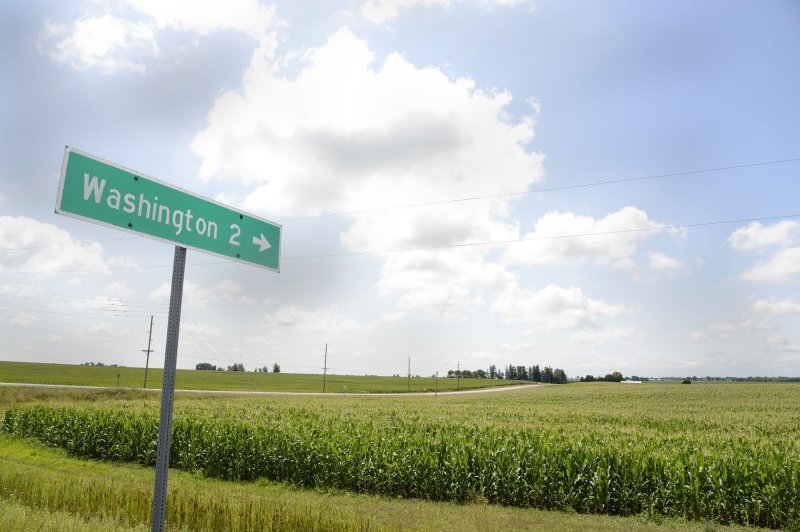A sign post points the way to rural Washington, Iowa, in Washington County, a long way from Washington, D.C, on August 6. File Photo by Mike Theiler/UPI |
License Photo
EVANSVILLE, Ind., Sept. 20 (UPI) -- The Chinese trade delegation canceled plans Friday to meet next week with Midwestern farmers impacted by the ongoing trade dispute with the United States.
The delegation had been preparing to visit producers in Nebraska and Montana following this week's trade negotiations with the Trump administration in Washington, D.C. The negotiations are expected to continue.
But President Donald Trump said at a press conference Friday that he felt no pressure to complete a deal with China before the 2020 election. He has maintained, however, that China wants to finalize an agreement to bolster its economy.
The Chinese delegates "said they were going to have to head back to China early," said Becca Colnar, a spokeswoman for the Montana Farm Bureau. "They didn't say why, just that they had to adjust their agenda."
The Nebraska Department of Agriculture also confirmed Friday that the Chinese delegation had canceled its trip to Omaha.
"We were informed this morning the Chinese delegation will no longer visit Nebraska," Chirstin Kamm, a spokeswoman for the Nebraska Department of Agriculture, said in an email.
China's decision to visit U.S. farmers had been seen as a positive sign. It was scheduled after that nation announced last week it would exclude pork and soybeans -- the commodities hardest hit by the tariffs -- from the latest round of tariff escalations.
Farmers, however, were slow to celebrate. The trade dispute began more than a year ago, and despite several signs that a deal may be within reach, it continues to escalate.
A number of agricultural industries have suffered in the prolonged trade war.
The soybean industry was hit hardest. Around 30 percent of U.S. beans went to China before the retaliatory tariffs were imposed in July. With that market essentially closed, American soy prices plummeted and farmers were left storing millions of bushels of beans.
Hog farmers also have been affected. Because of the tariffs, hog producers have been unable to capitalize on a time when they could be selling unprecedented amounts of pork to China. The African swine fever outbreak in that country will wipe out an estimated 30 percent to 50 percent of its hogs.
"With the combination of tweets, statements, disagreements and promises that China really is going to buy soybeans and pork this time, uncertainty kind of reigns," Blake Hurst, the president of the Missouri Farm Bureau, said following last week's tariff announcement.
"It's become impossible for any farmer to know what is going on."















